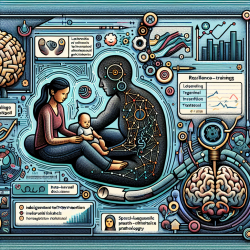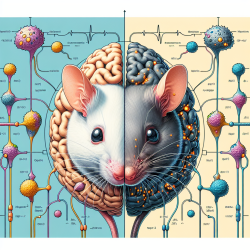The recent research titled "Development and Validation of Safe Motherhood-Accessible Resilience Training (SM-ART) Intervention to Improve Perinatal Mental Health" provides valuable insights into enhancing mental health outcomes for pregnant women. As a practitioner focused on creating great outcomes for children, leveraging these findings can significantly improve your practice.
Perinatal mental health issues, including anxiety and depression, affect approximately 10-20% of pregnant women globally. In Pakistan, the prevalence is even higher, with antenatal depression rates reaching 37%. Such mental health challenges can lead to various complications for both the mother and child, including low birth weight, developmental delays, and behavioral issues.
The SM-ART intervention was developed to address these challenges by building resilience among pregnant women. The intervention consists of six modules, each designed to foster specific resilience attributes such as self-efficacy, optimism, and emotional regulation. The modules were validated by a panel of mental health experts, ensuring their cultural and contextual relevance.
Key Findings and Implementation Strategies
1. Comprehensive Needs Assessment:
The first phase of the study involved a thorough needs assessment, including interviews with pregnant women and key informants. This helped identify the specific resilience attributes that needed to be addressed, such as emotional regulation and social support.
Implementation Tip: Conduct a similar needs assessment in your practice to identify the unique challenges faced by your clients. This will help tailor the intervention to meet their specific needs.
2. Innovative and Engaging Activities:
The SM-ART intervention includes a variety of innovative activities designed to engage participants actively. These activities range from reflective stories to interactive discussions, making the content accessible and engaging.
Implementation Tip: Incorporate diverse activities into your sessions to keep participants engaged. Use culturally relevant examples and materials to make the content relatable.
3. Comprehensive Facilitator Guide:
A detailed facilitator guide was developed to ensure consistent delivery of the intervention. This guide includes step-by-step instructions and resources for each module.
Implementation Tip: Develop a facilitator guide for your interventions. This will help standardize the delivery and ensure that all practitioners in your team can implement the program effectively.
4. Validation and Feedback:
The intervention was validated by eight mental health experts, who provided feedback on its content and structure. The high Content Validity Index (CVI) scores indicate that the modules are both relevant and practical.
Implementation Tip: Seek feedback from experts in your field to validate your interventions. This will help identify areas for improvement and ensure the content is effective and relevant.
Encouraging Further Research
While the SM-ART intervention has shown promise, further research is needed to test its effectiveness in different settings and populations. As a practitioner, you can contribute to this body of research by:
- Conducting Pilot Studies: Implement the SM-ART intervention in your practice and collect data on its effectiveness. Share your findings with the broader community to contribute to the evidence base.
- Collaborating with Researchers: Partner with academic institutions to conduct rigorous studies on the intervention's impact. This can help refine the program and expand its applicability.
- Engaging in Continuous Learning: Stay updated with the latest research in perinatal mental health and resilience training. This will help you incorporate evidence-based practices into your interventions.
By implementing the SM-ART intervention and contributing to further research, you can play a crucial role in improving perinatal mental health outcomes and creating better futures for children.
To read the original research paper, please follow this link: Development and Validation of Safe Motherhood-Accessible Resilience Training (SM-ART) Intervention to Improve Perinatal Mental Health.










